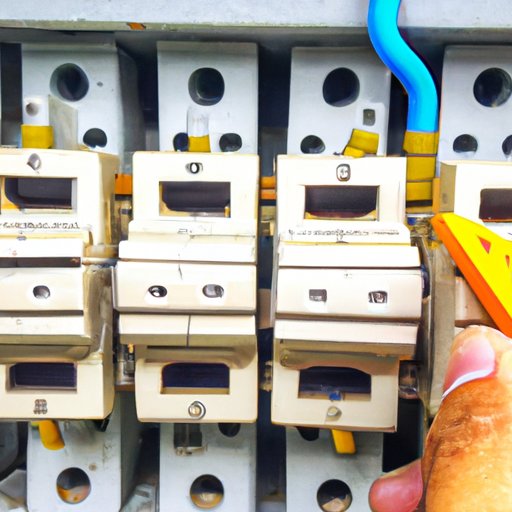Introduction
A circuit breaker is a device that helps protect your home’s electrical system from damage caused by overloading circuits, short circuiting, or ground faults. When a circuit breaker trips, it means that there has been an excess of electricity running through the system and the breaker has automatically shut off the power to prevent any further damage. Knowing why your circuit breaker keeps tripping is important for preventing power outages and avoiding fire hazards in your home.
An In-depth Look at the Causes of Breaker Tripping
When a circuit breaker trips, it can be caused by a number of different factors. Here are some of the most common causes of breaker trips:
Overloading Circuit
The most common cause of a breaker trip is when too much electricity is running through the circuit. This can happen if you have too many devices plugged into one circuit, or if you try to run multiple high wattage appliances on the same circuit. The National Fire Protection Agency (NFPA) recommends that circuits should not exceed 80% of their maximum load capacity.
Short Circuiting
A short circuit occurs when the hot wire comes in contact with the neutral or ground wire, resulting in a large amount of electricity flowing through the circuit. This can cause the breaker to trip in order to protect the electrical system from being damaged.
Ground Faults
A ground fault is when an electrical current flows through an unintended path, such as through a person or object. This can cause the circuit breaker to trip in order to prevent electrocution or damage to the electrical system.
Wiring Issues
Faulty wiring can also cause a circuit breaker to trip. This can include loose connections, damaged wires, or overloaded wiring. It’s important to have an electrician inspect your home’s wiring to make sure it is up to code and free of any potential hazards.

How to Diagnose and Fix Common Breaker Trip Problems
If your circuit breaker keeps tripping, the first step is to diagnose the problem. Here’s a step by step guide to troubleshooting circuit breakers:
- Check for any visible signs of damage to the breaker, such as burnt wires or broken components.
- Check the circuit breaker panel for any loose connections or tripped breakers.
- Test each outlet to make sure they’re working properly.
- Check the circuit breaker for any signs of corrosion or wear.
- Check all of the appliances connected to the circuit to make sure they’re functioning properly.
- If the breaker still trips, call an electrician to inspect the wiring.
In addition to the above steps, it’s also important to test your home’s electrical system to make sure it’s up to code and free of any potential hazards. An electrician can perform this type of testing and can provide advice on how to reduce the risk of future breaker trips.
Understanding Your Home’s Electrical System and Avoiding Breaker Trips
It’s important to understand the basics of your home’s electrical system in order to prevent breaker trips. Here are some tips for avoiding breaker trips:
- Reduce the amount of appliances plugged into one circuit.
- Avoid running multiple high wattage appliances on the same circuit.
- Make sure all of your outlets are grounded.
- Replace any faulty outlets or wiring.
- Have an electrician inspect your home’s wiring regularly.
Knowing when to call an electrician is also important. If you notice any signs of damage to the wiring, such as burning smells or sparks, it’s important to turn off the power and call an electrician right away.

Safety Tips for Dealing with Breaker Trips
When dealing with breaker trips, it’s important to take the necessary precautions to ensure your safety. Here are some safety tips to keep in mind:
- Always turn off the power before attempting to diagnose or repair a breaker.
- Never attempt to repair a breaker yourself unless you are a trained electrician.
- Always wear protective gear, such as rubber gloves and safety glasses.
- Contact an electrician immediately if you notice any signs of damage to the wiring.
Preventing Breaker Trips: What You Need to Know
Regularly inspecting your home’s electrical system is key to preventing breaker trips. Here are some tips for keeping your home’s electrical system in good condition:
- Regularly inspect wiring, outlets, and circuit breakers for any signs of damage.
- Reduce the electrical load on each circuit by unplugging unnecessary appliances.
- Make sure all of your outlets are grounded.
- Have an electrician inspect your home’s wiring regularly.

The Benefits of Knowing Why Circuit Breakers Trip
Knowing why your circuit breaker keeps tripping can help you be prepared for power outages and keep your home safe from fire hazards. According to a study conducted by the Electrical Safety Foundation International (ESFI), “knowing the reasons why circuit breakers trip can help homeowners identify and correct problems before they become dangerous or costly.”
By understanding the common causes of breaker trips, you can take the necessary steps to prevent them from happening. This can include reducing the electrical load on each circuit, inspecting wiring and outlets, and contacting an electrician if you notice any signs of damage.
Conclusion
Circuit breakers are an essential part of any home’s electrical system, and knowing why your circuit breaker keeps tripping is important for preventing power outages and avoiding fire hazards. This article has taken an in-depth look at the common causes of breaker trips and offered solutions to help you keep your home safe. By understanding the basics of your home’s electrical system and taking the necessary precautions, you can reduce the risk of a breaker trip and ensure that your home remains safe and secure.
(Note: Is this article not meeting your expectations? Do you have knowledge or insights to share? Unlock new opportunities and expand your reach by joining our authors team. Click Registration to join us and share your expertise with our readers.)
